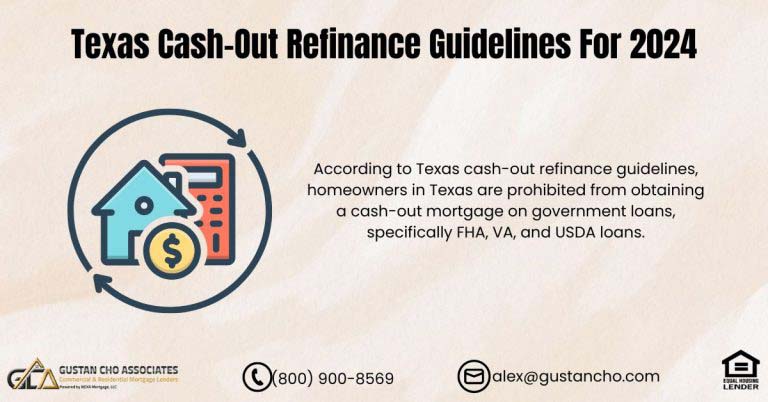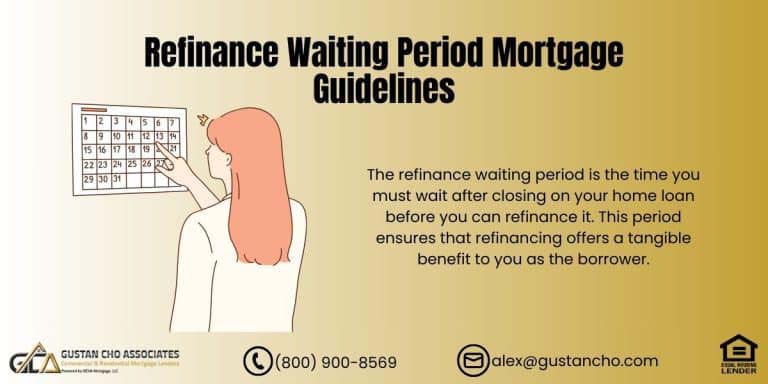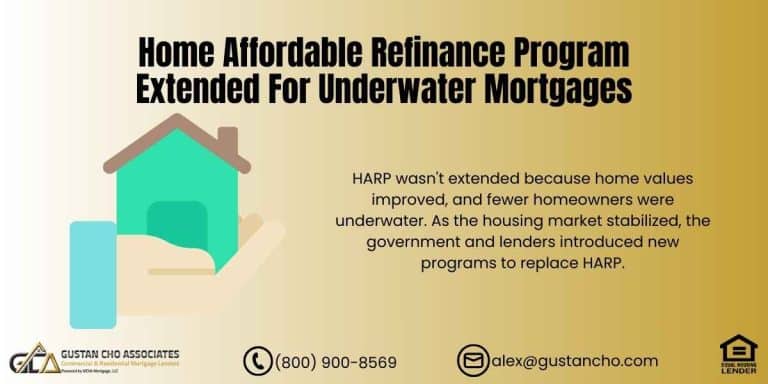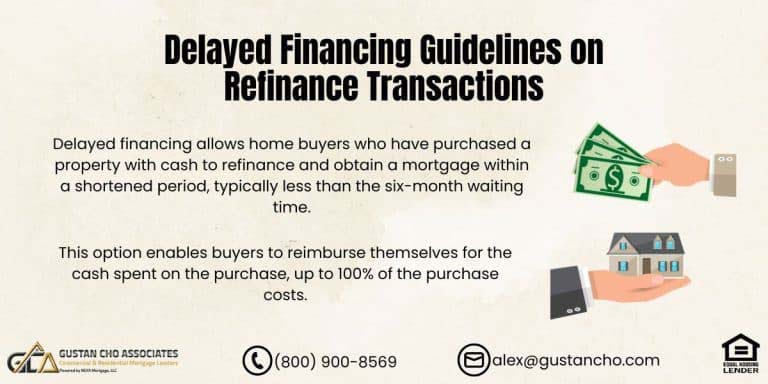This Article On Mistakes When Refinancing Mortgage To Be Avoided By Homeowners
Avoiding These 5 Mistakes When Refinancing Home Loan
The mortgage refinance process normally takes 30 to 45 days and for it to run smoothly in general with most lenders
- However, the average turnaround time at Gustan Cho Associates loans close in 21 days or less for a full refinance mortgage
- FHA or VA Streamline Refinance mortgages take two weeks on average to close at Gustan Cho Associates as long as everything is in order
- Homeowners need to avoid these 6 mistakes when refinancing
In this article, we will cover and discuss mistakes when refinancing a home loan.
Avoid Mistakes When Refinancing And Prepare Ahead Of Time
Refinancing is when homeowners get a new mortgage:
- Homeowners can pay off existing mortgage either to get a lower monthly payment due to a reduced mortgage rate
- They pay off the current mortgage to get a borrower off the mortgage note such as a co-borrower
- Or pay off the current mortgage to get a cash-out refinance mortgage
- Depending on the type of refinance mortgage loan owners are applying for, the mortgage process is similar to the home purchase
Borrowers will need to gather documents and paperwork required by their mortgage lender such as the following:
- two years tax returns
- two years W-2s, 60 days bank statements
- current paycheck stubs, closing paperwork
- most current mortgage statement from the current lender
- other documents pertaining to refinance mortgage loan
- By avoiding these 6 mistakes when refinancing, the refinance mortgage process will run much smoother
Homeowners should not go through a stressful mortgage process.
Shop For The Right Lender And Loan Officer
It is highly recommended that you start shopping around for lenders and loan officers with who borrowers feel comfortable.
- Take your time in researching not just the lender but also the loan officer
- The internet is a powerful tool for you to begin your research
- Check out the reviews and testimonials
- Also Google the loan officer
- See what types of complaints they may have
- Check for disciplinary actions they may have on their NMLS record
Remember that there are two sides to a story.
Choosing The Right Loan Officer And Lender When Refinancing Mortgage
There are many loan officers who are very reputable and care of their borrowers but may have gotten some bad reviews and testimonials because of the company they have worked for:
- A loan officer can do so much without the support of their employer
- For example, a loan officer can collect all docs from the borrower and have a complete package
- However, there are cases where mortgage companies may be short of processors and/or underwriters and may have the borrower’s file just sit which can cause delays
- Also, bad reviews from lenders may come from disgruntled employees
Or one unhappy borrower may go on a rampage by slandering a company in every single review site over and over.
Reviews And Testimonials Of Lenders And Loan Officers
If there are only 10 reviews about a lender and they are from 10 different borrowers in various different states and no positive reviews, then I would question that:
- However, if the majority are good reviews and testimonials and there are a few less than positive reviews, consumers need to be open-minded
- Decide whether the loan officer and the company you want to choose is the right professionals to represent you
- Besides checking the online reviews, the shopper should contact the loan officer and talk to them
- See how fast they get back to you when you leave them a message
- See if they will return phone calls in the evenings and weekends
- The number one reason for loan officer complaints by borrowers is because loan officers do not return phone calls timely and it takes the loan officer not hours but days to call borrowers back
- Return phone calls are one of the most important traits a loan officer needs to have for your loan process to go smoothly
- Shopping for the right loan officer and lender is a must
One of the 5 mistakes when refinancing borrowers make is not shopping for the right lender they as a borrower can get along with.
Importance Of Maximizing Your Credit Scores Prior To Refinancing
Before you turn in all of your docs to your loan officer, make sure that you have optimized your credit scores.
- Mortgage rates can vary greatly with credit scores
- Many borrowers who have lower credit scores may not realize they can easily boost credit scores by just paying down credit card balances
- Some consumers may have authorized user credit cards
- The main cardholder may have maxed out credit cards
- By removing yourself as the authorized user from the main cardholder, they may be able to boost credit scores
It will mean a large mortgage rate reduction due to higher credit scores.
Mortgage Rates On Conventional Versus Government Loans
Conventional Loans are more credit sensitive than government loans like FHA or VA Loans:
- To get the best possible mortgage rates on a conventional loan, borrowers will need a 740 FICO credit score
- Those with credit scores under 700 FICO can plan on taking a major mortgage rate adjustment hit
- Many borrowers with no credit or active revolving credit card accounts can easily get their credit scores boosted by just getting one or two secured credit cards with at least a $500 credit card limits
- Each secured credit card can boost credit scores by at least 20 or more points if you do not have any revolving credit card accounts
- Borrowers should also get a copy of their credit reports
- Carefully review each line item on their credit report to make sure it is accurate
- Remember that with Conventional Loans, to get the best possible mortgage rates, borrowers will need a 740 FICO
- Every 20 point drop of credit scores, consumers will get a pricing adjustment hits with Fannie Mae and/or Freddie Mac which means a higher interest rate
- Lower credit scores yield higher mortgage rates
This is because lenders view lower credit score borrowers as a higher risk of defaulting on their loans.
Plan Ahead On What You Are Going To Do With The Cash-Out Proceeds
Many homeowners will make the mistakes when refinancing of not properly planning on what they are going to do with the proceeds of their cash-out refinance.
- It is human nature to spend and cash at hand will go faster than you think
- Prior to refinancing, make a list of what you need the cash for
Here are some bullet points homeowners should consider using the proceeds of their cash-out refinance mortgages:
- Does your home need home improvements such as a new roof, windows, gutters, siding, driveway, kitchen, bathroom, appliances, HVAC systems, or other high ticket items
- Do you have a lot of high-interest debt such as double-digit interest rates credit cards?
- Do you need funding for a college education?
- Do you need money for a new business venture?
Do you need money for investments that will yield a higher rate of return than having money saved in the bank?
ARM Versus Fixed Rates
The fourth of 5 mistakes when refinancing is homeowners need to think hard on how long they intend in staying at the home they are refinancing.
- If they are planning on not staying more than seven years and moving to a larger and/or smaller home, then they should consider an adjustable-rate mortgage, or ARM, rather than a 30 year fixed rate mortgage
- Adjustable Rate Mortgages are 30-year mortgage loans
- ARM’s have a fixed-rate period for a certain amount of years
- Once that fixed-rate period is over, the mortgage rates adjust every year until the thirty-year term is up
- The advantage of ARMs is that mortgage rates on them are much lower than fixed rate mortgages
For example, a 7/1 ARM means that the mortgage rates are fixed for the first 7 years of the 30-year mortgage term:
- starting year number 8, it will adjust every year until the loan is paid for in 30 years
Homeowners who are refinancing their first starter home and do not plan on staying in the home for the long term should consider refinancing to an adjustable-rate mortgage instead of a fixed-rate mortgage.
The Final Of 5 Mistakes When Refinancing On Closing Costs And Break-Even Point
There are costs associated with refinancing a home loan. Unless the lender pays all closing costs with a lender credit, homeowners need to review and analyze total closing costs. We need to calculate how long it will take to break even on refinance.
- For example, if saving $200 per month by refinancing a mortgage and it costs you $2,400 in closing costs and fees, it will take homeowners two years to break even
- If you were to sell your home in less than the two years recapture break-even point, then it will not be wise for you to refinance
- However, if planning on keeping home for more than two years to reach the break-even point, then it will make sense to refinance
- This is because anything past the 24-month mark is a savings of $200 per month
- A homeowner should not refinance their home loan more often than needed
- This is because every time they refinance, their start clock resets
It will be a new 30-year mortgage term unless the borrower chooses a 15 year fixed rate mortgage loan.
How To Get Ready To Refinance And Avoid Mistakes When Refinancing
Refinancing a home loan should not be stressful if you get yourself prepared. Avoid Mistakes When Refinancing so the mortgage process runs smoothly. Below are the bullet points on how to get ready for refinancing a home mortgage and where borrowers do not have to stress during the mortgage process:
- Common Mistakes When Refinancing to avoid is not shopping with various mortgage lenders
- Getting along with the loan officer is one of the most important tasks
Do due diligence by checking out the lender:
- review their ratings and customer complaints
- check the NMLS Consumer Access to see if there are any habitual regulatory violations
- shop for rates and fees
Get a consumer copy of the credit report:
- Make sure that there are no errors on the credit report
- One of the most common Mistakes When Refinancing to avoid is to make sure there are no credit disputes
- Non-medical credit disputes during the mortgage process are not allowed and will halt the mortgage process if the balance total is greater than $1,000
- Maximize credit scores by paying down all of revolving credit cards.
- If you have lower credit scores, have the lender run your file through the FICO Analyzer
It will give options on what needs to be done to do to raise credit scores.
Avoid Mistakes When Refinancing By Getting Credit Tradelines
If credit scores are low because of no credit tradelines, then consider getting two to three secured credit cards with at least a $500 credit limits:
- For consumers with no revolving credit card accounts, each secured credit card can boost credit scores by at least 20 or more FICO points
- Do not pay off any older collection accounts and/or charge off accounts until consulting with the loan officer
- Paying off an older collection account and/or charge off account can plummet credit scores
- Determine how long you will stay on the home you are refinancing
- Ask the loan officer the best mortgage loan program
- Consider an adjustable-rate mortgage versus a fixed-rate mortgage loan if not keeping home for more than 7 years
- Find out what break-even point is when refinancing
For example, if saving $300 per month after refinancing and closing costs and fees of refinance is $3,600 that is added on the back of loan balance, the break-even point will be one year:
- $300 per month savings for 12 months is $3,600
So if planning on selling a home in less than a year of refinancing, it will not be worth it:
- This is because the break-even point is one year
- After you recapture loan costs which are after 12 months, you will be saving $300 per month so this makes sense
- By law, you need a net tangible benefit of 5% of reduction of your principal and interest in order to refinance
If you are a homeowner who wants to explore if refinancing your current home loan makes sense and will save you money, please contact Gustan Cho Associates at 800-900-8569 or text for a faster response. Or email us at gcho@gustancho.com. Gustan Cho Associates is a national five star national Fannie, Freddie, and Ginnie Mae Direct lender licensed in multiple states with a national reputation for no overlays on government and Conventional Loans and its 21-day closing business model. Homeowners and homebuyers can apply online at www.gustancho.com/apply-now. The team at Gustan Cho Associates is available 7 days a week, evenings, weekends, and holidays to take your mortgage inquiry and issue pre-approvals.










I like what this article recommends about choosing your lender carefully. It makes sense that it could be good to make sure the lender you choose can work for your situation. It’s something to keep in mind because I’d definitely want a lender that can accommodate to multiple different financial scenarios.